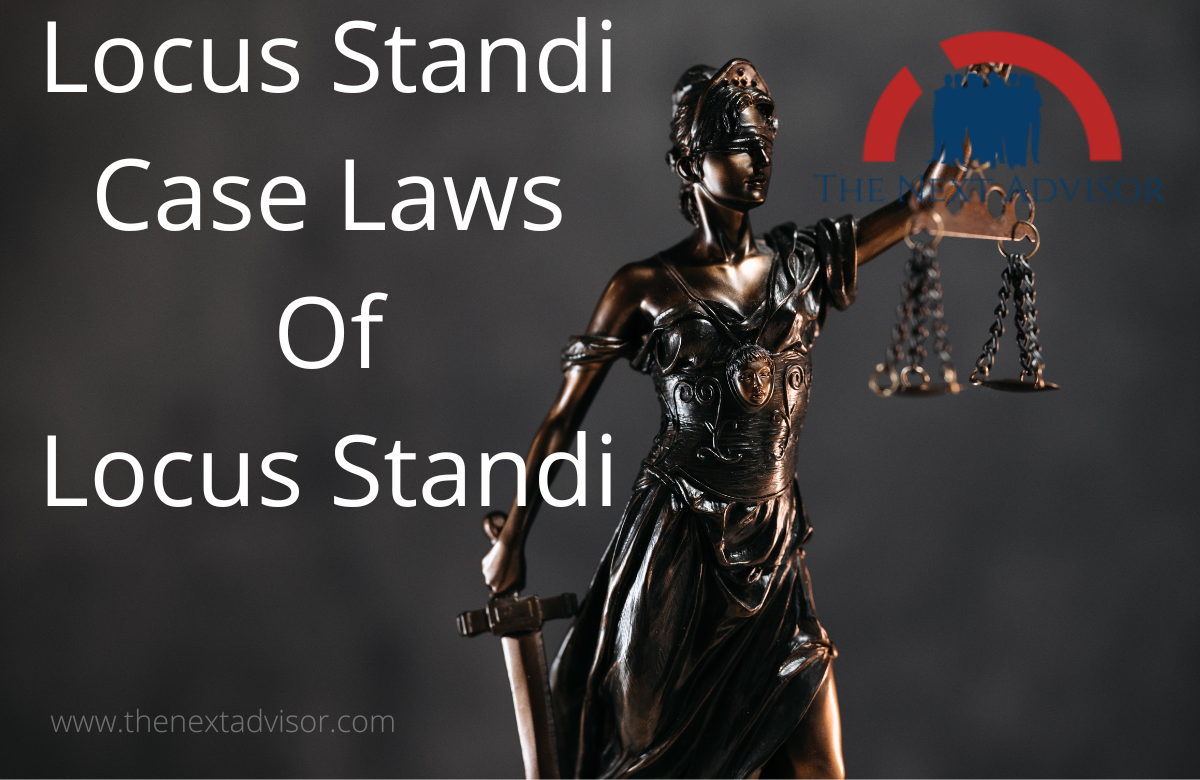INTRODUCTION
The traditional rule is that a person whose constitutional or legal right is infringed can apply for relief under Article 226 of the Indian Constitution. But the Supreme Court has now considerably liberalized the above rule of Locus Standi. The Court now permits the public-spirited persons to file a writ petition for the enforcement of constitutional and statutory rights of any other person or class, form if that person or class is unable to invoke the jurisdiction of the High Court due to poverty or any social-economic disability.
MEANING
The right or capacity to bring an action or to appear in a court. Article 32 & 226. Article 226 of the Indian Constitution is wider in scope than Article 32. Under article 226, the aggrieved party can approach the High Court for violation of not just their fundamental rights but also legal rights. However, under Article 32 of the Indian Constitution, a person can approach the Supreme court only for Violation of Fundamental Rights.
CONCEPT OF LOCUS STANDI
In legal parlance, Locus Standi means the right or capacity or standing to bring legal action. The question in Article 32 is whether a party filing for an action before the Court has the entitlement to do so. Does he have to be the one who suffered a legal injury, to be able to seek remedy under Article 32? This issue has been given a wide connotation by the Court.
SCOPE OF LOCUS STANDI
Now, a public-spirited person can avail of this provision on behalf of socially or economically disadvantaged persons, if such persons are unable to defend themselves. In the case of public interest litigation, the strict rule of Locus Standi applicable to private litigation is relaxed and a broad rule is evolved by the Courts in Modern Times. The right of Locus Standi can be given to any member of the public acting bonafide and having sufficient interest in instituting an action for redressal of public wrong or public injury.
BANDHU MUKTI MORCHA VS UNION OF INDIA
In this case, the Court held that the Public Interest Litigation is not adversary litigation but a challenge and opportunity to the Government and its officers to make basic Human Rights meaningful to the deprived and vulnerable sections of the society. The court is thus assisting them in the realization of the constitutional objectives. The court has the power under article 32 to appoint a Commission for making inquiries concerning the violation of human rights.
AKHIL BHARTIYA SOSHIT KARMACHARI SANGH VS. UNION OF INDIA
Akhil Bhartiya Soshit Karmachari Sangh Vs. Union of India ( AIR 1981 SC 298 ) In this case the Supreme Court held that the Akhil Bhartiya Soshit Karmachari Sangh ( Railway ) through an unregistered association, could maintain a writ – petition under Article 226 of the Indian Constitution for the redressal of a common grievance. Access to justice through ‘ class action ‘ . ‘ Public Interest Litigation ‘ and ‘ Representative Proceeding ‘, is the present Constitutional jurisprudence, Krishna Iyer, J declared.
JASBHAI MOTIBHAI DESAI VS. ROSHAN KUMAR, HAJI BASHIR AHMED
In Jasbhai Motibhai Desai vs. Roshan Kumar, Haji Bashir Ahmed, the Bombay High Court has dismissed the writ petition on the ground that no right vested in the appellant had been infringed, prejudiced, or adversely affected as a direct consequence of the order impugned by him, and as such, he was not an aggrieved person having a locus standi in the matter. Question: – Write a short note on the ‘ Concept of Locus Standi? Answer: – The concept of Locus Standi is very old. When Judicial administration came into Practice, then the right of locus standi arose.
Meaning: – The meaning of locus standi is that-
• Right to be heard.
• right to move to court for the enforcement of own legal rights.
It is well – an established conception of law that no one can be unheard and it is also the principle of natural justice that proper opportunity should be provided to the parties of hearing in the proceedings of the court.

Locus Standi – Case Laws Of Locus Standi
Case: – M. Global facilities Vs State of Punjab:- It was said in this matter that it is expected in the principle of natural justice to provide the opportunity of bearing and speaking on reason.
Case: – Fateh Singh Vs State of Rajasthan. It was held by the Rajasthan High Court that every person has a fundamental right to be heard.
Case : – E.I.D. Peri Limited Vs Kolkata Port Trust. It was decided by the Kolkata High court that proceeding without the reasonable opportunity of hearing is a violation of the principle of natural justice. This concept is also based on the concept of equity. Justice and good conscience .
Importance: – The importance of Locus Standi is based upon the maxim ” Ubi jus ibi remedium ” . In law and Constitution every person has some legal rights and for the enforcement of such legal rights has the right to move to court. If not so then these rights become meaningless .
Thus, every person has the right to go to court for the execution prevention and protection of their rights. It is his fundamental right and he cannot be restricted to use this fundamental right. Such right is known as Locus Standi .
Ancient Theory: In customary ancient law, ordinarily the person whose fundamental or other right has been violated may file a petition for the enforcement of such rights. In other words, a party only has the right to move the.
Liberalization: The old and traditional theory has changed with the passing of time and it is established that no one should be deprived of justice. If a person is poor or has no sufficient means to face the court, then any person or organization on his behalf can file suit. It is known as Public Interest Litigation.
The theory is according to article 39A of the Constitution in which it is said that no person should be deprived of justice due to poverty or any other reason. We may call it a concept of ‘ Justice to the poor. ‘ The main object of this conception is to provide equal opportunity to weaker Sections of the society.
The theory is according to article 39A of the Constitution in which it is said that no person should be deprived of justice due to poverty or any other reason. We may call it a concept of ‘ Justice to the poor. ‘ The main object of this conception is to provide equal opportunity to weaker Sections of the society.
Justice P.N. Bhagwati viewed that, ” Justice is not legacy of rich person. Now the temple of justice is opened to common people. ”
Justice Krishna Aiyyar expressed that, ” the narrow conception that only victim person can go to court is finished and replaced by class action, public interest litigation, representative action, etc. ” Now any person can go to court for the protection of his or other person’s right.
There are many cases where the locus Standi is expanded widely as
● Protecting water of the Ganga from pollution. ( M.C. Mehta Vs Union of India )
● Protecting the aesthetic of the Taj Mahal. ( M.C. Mehta Vs Union of India )
● Right to use pollution-free water. ( Jammu Consumer Council Vs State )
Cuttings of Newspapers and letters:
Now, locus standi has been so wide that the cuttings of newspapers and letters are considered writ, and proceedings are done on the basis of these by higher courts.
Thus the conception of locus standi is expanding day by day. Public interest litigation and Social Action Litigation have become the traditional conception of Locus Standi .
Essential conditions: – But the applicability of Locus Standi is also subject to the following conditions:
●The case must be related to the Public interest at large.
●They contain social interest.
●Not politically motivated.
●Must Bonafide etc.
Case : – Kishor Bhai D. Panchal Vs Chief Secretary, State of Gujrat Gujrat high court held that the object of public interest litigation is not to settle the political disputes.


























